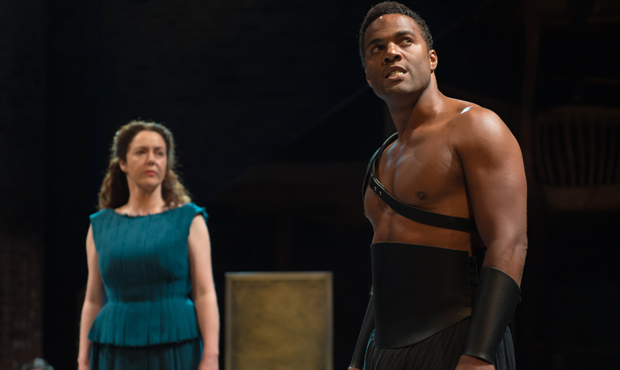Hecuba (Swan, Stratford-Upon-Avon)
Eric Whyman’s ‘starkly classical and timeless production’ opens in the Swan

© Topher McGrillis
With Henry V storming through France on a colonising mission on the main Stratford stage, war's aftermath has settled like a cloud on the Trojan women in the Swan: taking the 1200 or so lines of Euripides's tense verse drama of woe and retribution, Marina Carr has written fifty pages of descriptive memory speeches and dreams of disaster.
Leading Eric Whyman's starkly classical and timeless production, in a hall of mirrors lit by a single large standing candle, Derbhle Crotty as the captured Queen of Troy mourns the loss of her sons, numb with grief, attended by two daughters, Cassandra and Polyxena, whose fate is insecure.
Euripides' Chorus is removed, allowing the characters to incorporate their own commentary and analysis. The result is both unreal and hypnotic, and as the play recaps so many events and feuds of the past, you feel trapped in a nightmare which is recounted, virtually, in the third person.
The other strange element in Carr's version is the love affair Hecuba suddenly embraces with her captor, Ray Fearon's athletic Agamemnon, who is simultaneously lining up Polyxena (Amy McAllister) as a good luck sacrifice to send him on his way; he originally set sail, as we've seen in the Almeida Oresteia now playing at the Trafalgar Studios, after appeasing the gods with the murder of his own daughter. Hecuba's lust is both carnal and vengeful.
Whereas the Almeida Oresteia invents new scenes from the speeches, Carr does the opposite and creates new speeches from the scenes, re-jigging the order of them and treating the murder of Hecuba's youngest remaining son, Polydoros, in a completely different, and surprising, way.
Similarly, the other kings, Odysseus (Chu Omambala), king of Ithaca, and Polymestor (Edmund Kingsley), king of Thrace, are less forging a new political coalition with Agamemnon than indulging their own versions of what has gone on. Until, that is, Polymestor, himself now blinded and betrayed, is jolted into the terrifying, tragic present.
Carr thinks that Hecuba has had a bad deal and sets out to re-examine and redeem her. She and Crotty certainly present a figure of enormous dignity and emotional decorum; Crotty plays both the advanced age of the character, her maternal grandeur, and the unimaginable suffering and humiliation she has somehow channelled into an imposing, granite-like defiance. Nadia Albina's Cassandra, on the other hand, pushes her reputation for skittishness to another sort of extreme, that of a slinky bad girl.
The Greeks are keen to get home after ten years of war, but first Agamemnon wants to impose his own civilisation or "democracy" (though he doesn't call it that) on the territories he's destroyed. This is unlikely to happen.
The legacy of war is a population of ghosts, and Crotty's Hecuba is their spokesperson. It is a great performance, one that stirs memories of her recent predecessors in the role, Vanessa Redgrave, also with the RSC, and Clare Higgins at the Donmar; it's as if they, too, ten years on, have become part of the tragic story in this house of reflecting glass.
Hecuba runs at the Swan Theatre until 17 October.












